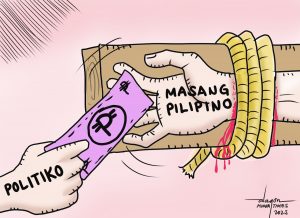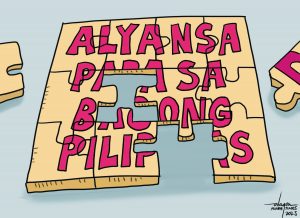One of the best news I have heard this Christmas Season is the decision of our President to try and restart the peace talks with the CPP/NDF/NPA and this was soon followed by the announcements of ceasefire from both sides.
Indeed, the Spirit of the Season is conducive to peace but, make no mistake about it, there are a lot of hurdles to overcome before we can recover the strides already reached before and see light at the end of the tunnel.
There will always be doves and hawks, on both negotiating sides. Doves are those who see the peace talks and its pursuit of a final peace agreement as the solution to the controversy between the warring sides while the hawks are those who would opt for a military solution.
This is normal and this is quite alright because everyone is entitled to an opinion and it is an expected and accepted part of the environment of every attempt at reaching a peace agreement. Precisely, for any attempt at peace negotiations to be successful, the doves must come up with something that is also palatable, if not totally acceptable, to the hawks. Reaching such a consensus is key to the negotiations.
What, for me, is unacceptable are the hawks on both sides who will do everything to sabotage the talks. These are the people who will not even give peace a chance and who will jump at any opportunity to disrupt or end even just the intention to come to the negotiating table.
Examples of these are military and police officers who will stoop to filing trumped up and totally baseless charges against anyone they perceive to be leaders in progressive and militant groups even if they cannot establish any actual link to the armed rebellion.
I would like to be clear that there are many in the military and the police who are very much against such unscrupulous tactics. I like the way a friend of mine, who is a retired military general, put it “Kaya nga tinawag nating legal front yan kasi “legal,” walang violation sa batas, e bakit mo titirahin? Kapag nakita ko sa bundok yan na may baril, aba, babarilin ko kasi illegal na yan. Magkaibang magkaiba yan.”
On the side of the left, there are also NPA commanders who may purposely violate ceasefire agreements to discourage and disrupt the peace talks. In this, they are no different from the abusers and oppressors in the military whom they claim to spite.
Some of those from the extreme right will say, “Why should we talk to them when we can surely win the war?” To them I say, the war, in various forms, has been existing for more than fifty (50) years, a very long time for Filipinos to keep on killing Filipinos. If it could be surely ended, then why has it persisted for this long?
Others say a peace agreement will not end the ideological conflict between the left and the right. Of course not, because for as long as people have different views, there will always be conflict. The goal of the peace talks is NOT to end the ideological conflict but to bring the conflict from the battlefield to the legal political arena where differences can be argued, debated and threshed out openly instead of down the barrel of a gun.
“The people we are talking to have no control over the NPA soldiers in the field, how will a peace agreement be enforced?” This is why there is a need for confidence building measures, an exchange of bona fides, so to speak.
This being said, I do expect that if, and when, we have a final peace agreement, there will be members of the NPA who may not abide by it, particularly those who have already been corrupted by the unilateral enjoyment of proceeds revolutionary taxes collected but unremitted to their central organization. These people are no longer rebels but common bandits. The good thing about a peace agreement is that they can be declared as such and thus, the state can go after them as common criminals without the mantle of ideology or rebellion anymore.
What many do not realize is that there are actually many goals and even demands that are common to both sides. For example, with regards the negotiations on socio-economic reforms, one of the perennial issues has always been the disproportionate distribution of wealth among our people because of the concentration of wealth in a very small percentage of the population.
Well, an unscrupulous and abusive oligarchy is really an undeniable social problem that the government would have to address, whether or not there are peace talks so, what is wrong with agreeing to reforms designed to alleviate this problem?
One last matter that I would like to talk about is this nagging question from many people “Why should we talk to the rebels when they are still engaging in attacks?”
The state that we are in, vis a vis the leftist rebels is WAR. We are engaging in peace talks to try and stop the war. Starting the talks will not automatically end the war because the end of the war is the ultimate goal of the peace talks. Demanding otherwise is putting the cart before the horse, so to speak.
In other words, we cannot reasonably expect an automatic stoppage of attacks from the NPA just because we started the peace talks just as our military will also not stop operations against them while the talks are ongoing.
It is good that now, we have declared ceasefires on both sides so, based on this, for as long as the ceasefire holds, there should be a cessation of combat activities and operations on both sides. Let us hope and pray that it holds.
In ending, while I may be accused of being naively optimistic about it, I do hope that the Spirit of the Season will touch the hearts of those who have a say on securing peace for our people. May those who are hawkish see through the eyes of the doves and at least give peace a chance.


